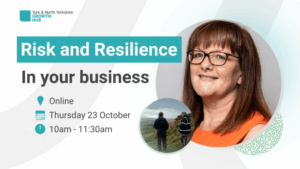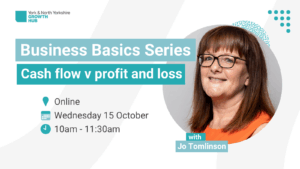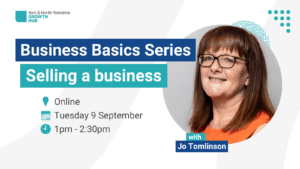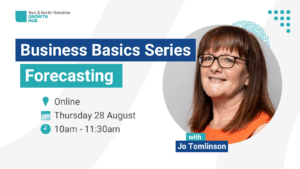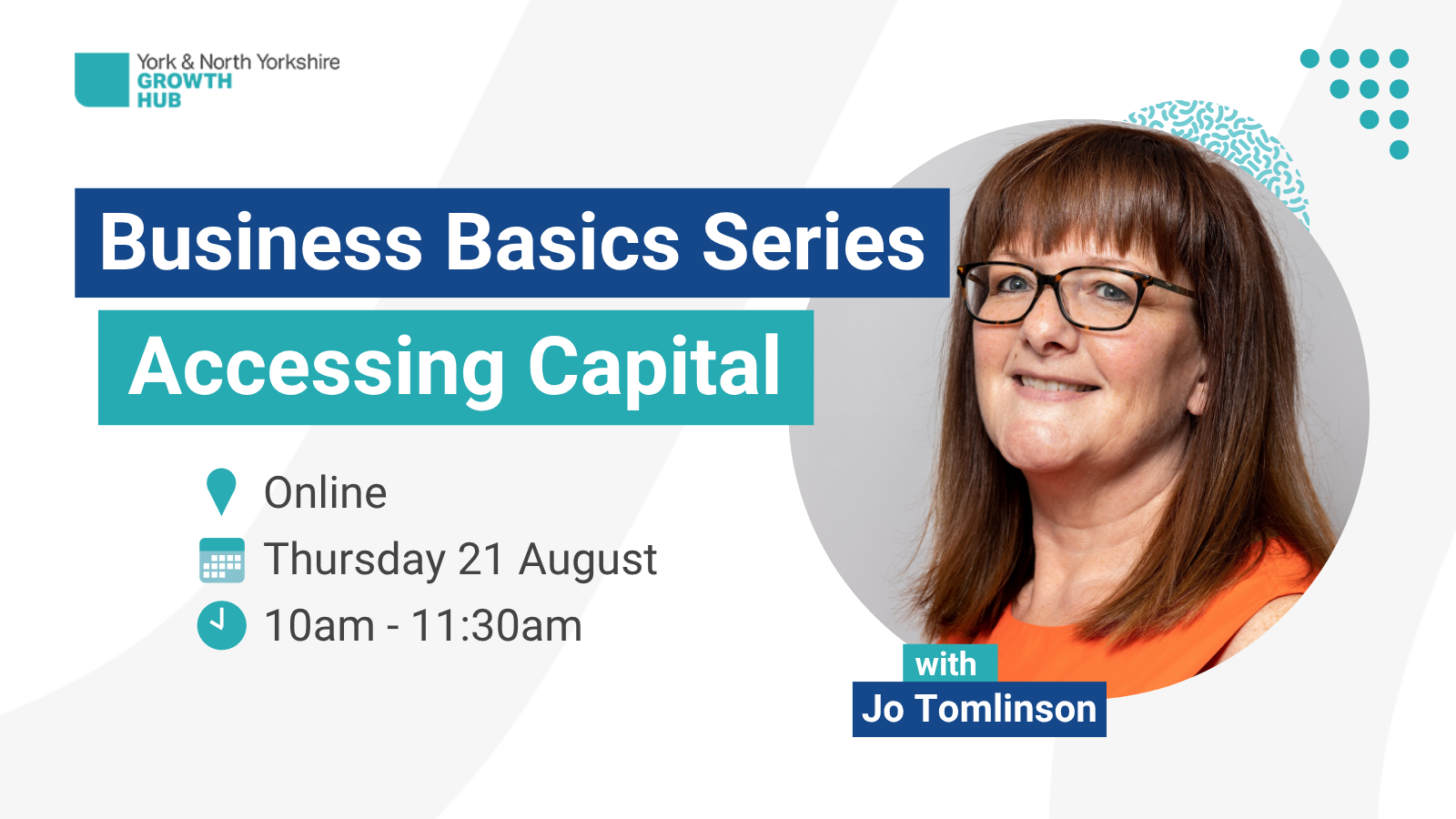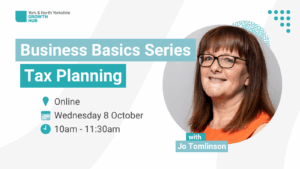Inflation in the UK and 5 actions you can take now
By Simon Middleton, Business Relationship Manager

Inflation at its simplest is the term used to describe rising prices. With costs continuing to increase at their fastest rate for 40 years, inflation in the UK is having a fundamental impact on businesses across the region.
In May 2022, Barclays’ SME Barometer – a quarterly survey of business sentiment conducted for the bank – found that three-quarters of small and medium-sized companies were worried about the impact the cost of living crisis, soaring energy bills and rising inflation will have on their business.
In this article, I explain more about how the rate is calculated, the impact of high inflation, and ways in which you can protect your business.
How is inflation in the UK calculated?
The rate of inflation is determined every month by the Office for National Statistics (ONS) who check over 700 services and goods that are standardly bought in our country. This could be as small as a loaf of bread to more major purchases like a car.
The overall cost of that generates the Consumer Prices Index (CPI). By comparing what the CPI is now to what it was a year ago, the ONS are able to determine the rate of inflation. So, with inflation at 9% or higher, an item that cost £10 last year would now be expected to cost around £10.90. Plus, the higher the value of the item, the bigger the increase would be.
Why is high inflation in the UK a problem?
The Bank of England is targeted by the Government to keep the rate of inflation in the UK at around 2%, which supports a more stable economy because people and businesses can organise their finances more effectively.
While fluctuations are expected, unstable and high rates can be harmful as the unpredictability makes it difficult for people and businesses to plan how they will spend, save and invest their money. In extreme cases, it can even lead to an economy collapsing altogether.
In the region, I am helping business owners who are facing common issues arising from the surging rate of inflation in the UK. Supply shortages, increases in materials and shipping costs, as well as supply chain delays, are leading to missed contracts and over-stretched cash flow.
As well, employee costs are rising as workers ask for wage increases to cover higher living costs. Alternatively, they are choosing to move to new positions that pay more or require less travel in order to lower fuel-related costs. As a result, labour shortages are also emerging, especially is less connected rural areas.
What you can do
Taking advice from North Yorkshire-based accountants M Wasley Chapman, the good news is that there are some simple steps you can take in your business to tackle rising inflation in the UK:
1: Undertake a costs review
Review spending across all areas of your business. How much control is being taken over the spending and costs that are going out of the business?
2: Identify immediate gains
Are there any that can be made by changing suppliers, negotiating new rates, or stopping some costs altogether? Can you also use funded opportunities to upskill your workforce in key areas rather than outsource?
3. Look at your profit
Identify the most profitable revenue streams in your business. If you’re not generating profit from each and every customer then you have to question why you are supplying them unless there is a longer term objective in mind.
4. Evaluate your pricing
This might be something you look at first but it must be considered from various angles and the effect it will have.
> Watch now: How Much? – A Guide to Setting your Prices at the Right Level
5. Speak to an expert
Working with an expert such as an independent accountant can help you with monthly management and planning services not just your traditional year-end accounts.
Get support
If rising inflation in the UK is affecting your business, we can help. At York & North Yorkshire Growth Hub, we provide tailored advice through our helpdesk and business relationship managers or we can signpost you to the right support to help you overcome the challenges you are facing. You can call us on 0800 246 5045 or complete the form below and a member of our team will be in contact.
Autumn Budget 2025 – How will it impact your business?
The Autumn Budget, announced on 26 November 2025, introduced a range of changes that business owners need to be aware of. From updates to taxation and compliance rules, to adjustments in incentives and support schemes.
Risk and Resilience in Your Business
Running a business can be risky. There are so many things that can impact your performance, and profit. Potentially destroying all that you worked so hard to build. Some of these things are impossible to plan for, but lots of potential risks can be mitigated by identification and planning.
Business Basics – Cash Flow v Profit
Many small business owners can get confused when looking at numbers relating to their business, and often this is due to cash and profit being understood as one and the same thing. It is crucial to understand the difference between these two metrics so that decision making is not flawed.
Business Basics – Project Evaluation
Projects can be anything from taking on a new person, or launching a new product, to building a manufacturing site, or acquiring a business to merge with the current one. How you evaluate each project can vary depending on size and complexity. But undertaking the exercise leads to better decision making and control.
Building Resilience and Sustainability into your Farming Business
Resilience and sustainability lie at the heart of modern farm business strategies, ensuring that agricultural enterprises can withstand economic shocks, adapt to evolving environmental regulations, and maintain profitability amid climate volatility. By embedding sustainable practices, ranging from energy efficiency to regenerative soil management, farmers not only safeguard their livelihoods but also contribute to broader goals of food security and environmental stewardship.
Business Basics – Shared Ownership
Directors and shareholders of UK companies have many rights and responsibilities, but how do these change when you are one of a number of shareholders in a company?
Business Basics – Selling a Business or Shares in a Business
Being aware of your business's value enables you to determine a fair selling price for some or all of your shares and negotiate efficiently with prospective buyers. But where do you find a buyer for your shares, and what happens now?
Business Basics – How much is your Business Worth
Being aware of your business's value enables you to determine a fair selling price for some or all of your shares, negotiate efficiently with prospective buyers, and secure beneficial financing deals, among other advantages.
Business Basics - Forecasting
Although we don’t have a crystal ball, so forecasts are fundamentally informed guesses, businesses need to use them to make informed business decisions and develop business strategies.
Business Basics – Accessing Capital for Growth
Gaining access to outside investment means you don’t have to give up on your dream. So how do you prove to any potential investor that your business model is worth
Farm Diversification: Where to start
According to DEFRA, 71% of farm businesses in 2023/24 have some form of diversified activity, up from 61% in 2014/15. Income from these activities produced £1.393 billion in 23/24, up from £1.321 in the previous year. This demonstrates how important these income streams have become.
Business Basics – Making Tax Digital
Making Tax Digital (MTD) for Income Tax and Rental Income is the biggest change to Self-Assessment since it was launched by HMRC over 30 years ago.
Young Entrepreneur Guide
Do you have a business idea? Or do you want to work for yourself? Then the Young Entrepreneur Guide is here to help you!


